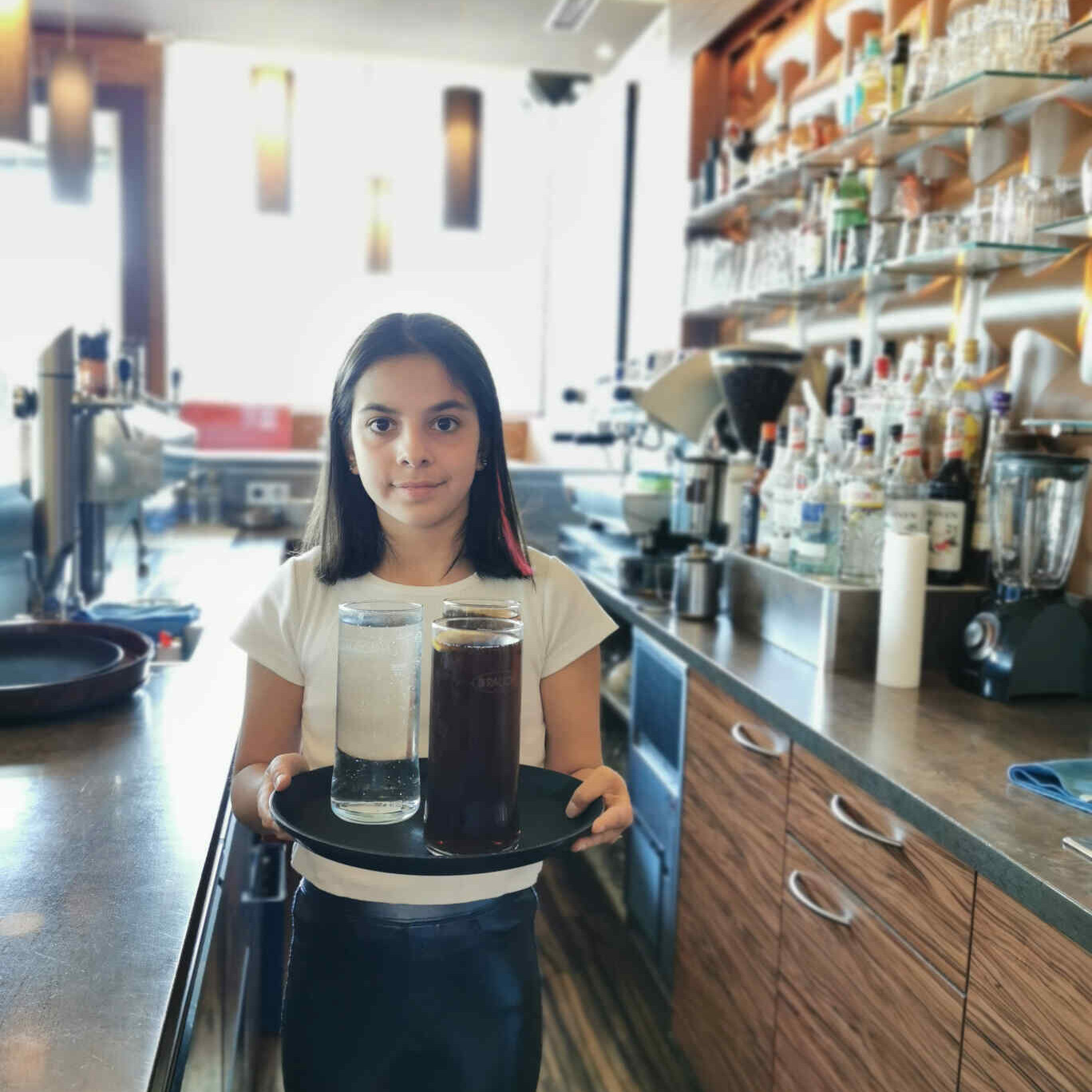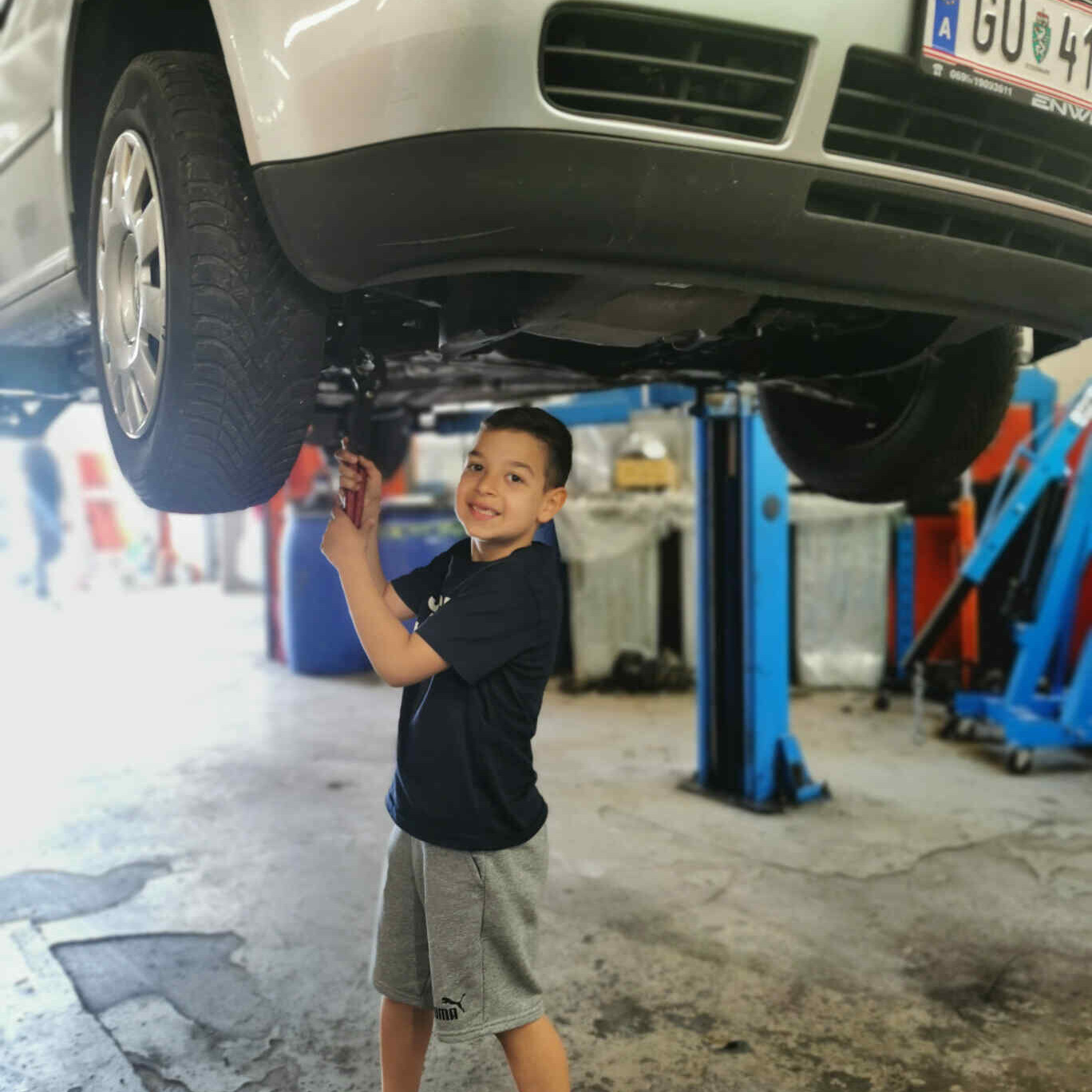Bring Your Child to Work-Day
Mitarbeiter von Unternehmen sind eingeladen, ihre Kinder einen Tag lang an ihren Arbeitsplatz mitzunehmen. Der “RealityCheck”-Ansatz dazu ist: Kinder wissen zunehmend nicht, was ihre Eltern “wirklich tun”. Ein “Take-away” zur Arbeit von Vater und Mutter kann einen authentischen Einblick in einen Ausschnitt der realen Arbeitswelt bieten.
Zugleich ermöglicht diese gemeinsame Erfahrung einen familiären Diskurs über Arbeit und Arbeitswelt.
Der Realitätscheck “Bring Your Child to Work Day”lädt Unternehmen ein, ihre Mitarbeiter zu ermutigen, ihre Kinder - in der Regel aus der 3. oder 7. Ziel ist es, den Schülerinnen und Schülern einen authentischen und lebendigen Eindruck davon zu vermitteln, was ihre Eltern, Verwandten oder engen Familienangehörigen in ihrem Beruf tun. Indem sie ihre Mutter, ihren Vater oder eine andere Vertrauensperson bei der Arbeit begleiten, erhalten die Kinder aus erster Hand Einblicke in die alltäglichen Aufgaben, das Arbeitsumfeld und die Relevanz der verschiedenen Fähigkeiten.
Die pädagogische Methode folgt einer einfachen, aber effektiven Struktur: Erleben - Begleiten - Reflektieren. Die Schüler erleben den Arbeitsplatz direkt, werden von ihren Eltern oder Verwandten angeleitet und begleitet und reflektieren später sowohl zu Hause als auch in der Schule über das Gesehene und Gelernte. Diese Kombination schafft eine starke emotionale Verbindung zwischen Familienleben, Schule und beruflicher Orientierung und hilft den Kindern, die Bedeutung des Lernens für reale Berufe zu verstehen.
Lernergebnisse
Zusätzliche Lernergebnisse
- Dieses Format ist ein besonders effektiver Ansatz, um Unternehmen zu motivieren, ihre Mitarbeiter in ihrer Rolle als Eltern anzusprechen und so den Kontakt zu Schulen für “RealityChecks” zu aktivieren.
- Der Tatsache, dass Kinder nicht mehr wissen, was ihre Eltern beruflich machen, was durch viele Studien (Bertelsmann, Shell, etc.) belegt ist, kann mit diesem Format wirksam begegnet werden.
- Besonders innovativ ist, dass nicht nur die Schule und die Eltern, sondern auch die Unternehmen aktiv in diesen Prozess eingebunden werden - dies vervielfacht die Wirksamkeit dieses Ansatzes.
Dauer
Altersgruppe
Art der Tätigkeit
Kontakt
Land: Österreich
Kontaktperson: Dr.in Michaela Marterer
E-Mail: mm@stvg.com
Umsetzung
Schritt für Schritt
- Koordinierung mit den SchulbehördenZielgruppe (3./7. Klasse), rechtliche und sicherheitstechnische Anforderungen, Dauer und Zeitrahmen festlegen.
- Informationen für Unternehmen: Bereitstellung klarer, detaillierter Materialien zur Unterstützung der internen Kommunikation und der Beteiligung der Mitarbeiter.
- Zentrale Registrierung über die SchulenAnkündigung, Kommunikation mit den Eltern, Sammlung von Anmeldungen, Erstellung von Teilnehmerlisten.
- Vorbereitung und MaterialienInfo-Blätter für Eltern/Kinder (Zweck, Zeitplan, Erwartungen, Nachbereitung); Klärung von Sicherheitsfragen, Kleidung, Versicherung; Überprüfung der Materialien.
- Umsetzung in UnternehmenKinder begleiten ihre Eltern/Verwandten, erhalten authentische Einblicke in die Arbeitswelt, stellen Fragen.
- Unterstützung durch Berufsberatungspersonal (BFB)Koordinierung, Motivation, Funktion als Schnittstelle zwischen Schulen und Unternehmen, Gewährleistung einer reibungslosen Organisation.
- Nachbereitung und BewertungOnline-Umfrage, Reflexion in Schule und Familie, Dokumentation der Erfahrungen und Planung künftiger Ausgaben.
Beteiligte Berufe
Der entscheidende, innovative Aspekt besteht darin, dass die Unternehmen eingeladen und motiviert werden, ihre Mitarbeiter in ihrer Rolle als Eltern von Schulkindern zu sehen und über diesen Kanal Kontakt zu Schulen, Lehrern und Jugendlichen zu finden.
Bisherige Ansätze in dieser Richtung (Beispiel “Töchtertag’) suchen eher den Kontakt über die Schule - bei diesem Ansatz ist die aktive Einbeziehung der Unternehmen mit ihren Mitarbeitern der innovative Ansatz.
Die Rolle der Eltern bei der Entscheidungsfindung in Bezug auf die Bildungs- und Berufswahl ist zweifelsohne gut dokumentiert, wenn auch in unterschiedlicher Form.
Die Einbeziehung der Eltern in ihren persönlichen “Beruf” im Arbeitsleben ist der wesentliche Aspekt dieses RealityCheck-Ansatzes, kombiniert mit der Aktivierung der Unternehmen, diese Rolle ihrer Mitarbeiter auf der Grundlage der Merkmale im Unternehmen zu nutzen
Vorbereitung und Nachbereitung
Unter Vorbereitung, Unternehmen, Schulen und Eltern wurden über Ziele und Vorteile informiert, während rechtliche und organisatorische Fragen (Haftung, Sicherheit, Verfahren) frühzeitig geklärt wurden. Gebrauchsfertige Vorlagen für Aufrufe und Einladungen erleichterten die interne Kommunikation in den Unternehmen. Schulen und Elternverbände wurden einbezogen, um das Bewusstsein zu stärken, und die Koordination mit der Bildungsdirektion sorgte für die offizielle Genehmigung und die Einbettung der Initiative in den Bildungsrahmen.
Nachbereitung konzentrierten sich auf Reflexion und Bewertung. Die Kinder diskutierten über ihre Erfahrungen zu Hause und in der Schule und verknüpften alltägliche Eindrücke mit der Relevanz von Themen. Die Lehrer bauten dies in den Unterricht ein, während Rückmeldungen von Schülern, Schulen und Unternehmen durch Umfragen gesammelt wurden. Die Ergebnisse zeigten eine hohe Motivation und deutliche Lerneffekte. Die gewonnenen Erkenntnisse wurden dokumentiert, um das Format weiter zu verbessern und nachhaltig fortzuführen.
Zusätzliche Ressourcen
Dokumente
Bewertung
Der RealityCheck wird durch Schüler- und Lehrerfeedback (Umfragen, Interviews), Beobachtung von Motivation und Lerneffekten und Unternehmensreflexionen evaluiert. Die Ergebnisse zeigen Vorteile, Herausforderungen und Verbesserungsbedarf für eine nachhaltige Umsetzung auf.



